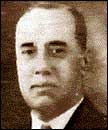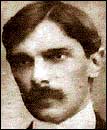

Simon Commission [1927]
|
|
|
Edwin Montague along with the then Viceroy of India, Lord Chelmsford published a report on Indian constitutional reforms which formed the basis of the Indian Act of 1919 |
The government of India Act of 1919 was essentially transitional in character. Under section 84 of the said Act, a statutory commission was to be appointed at the end of the ten years to determine the next stage in the realization of self rule in India.
The British government appointed a commission under Sir John Simon in November 1927. The commission which had no Indian members on it was being sent to investigate India’s constitutional problems and make recommendations to the government on the future constitution of India.
|
|
|
Simon Commission had no Indian members |
The Congress decided to boycott the Simon Commission and to challenge Lord Birkenhead, Secretary of State for India, to produce a constitution acceptable to the various elements in India.
Shafi's faction
of the Muslim League cooperated with the Simon
Commission There was a clear split
in the Muslim League. Sir Muhammad Shafi, wanted to cooperate with
the commission, decided to hold Muslim League session in Lahore in
December, 1927.
Jinnah's
faction of the Muslim League boycotted the Simon
Commission The other faction, led by Jinnah stood for the boycott of the
commission, held the Muslim League session at Calcutta and decided
to form a sub-committee to confer with the working committee of
Indian National Congress and other organizations with a view to
draft a constitution for India.

